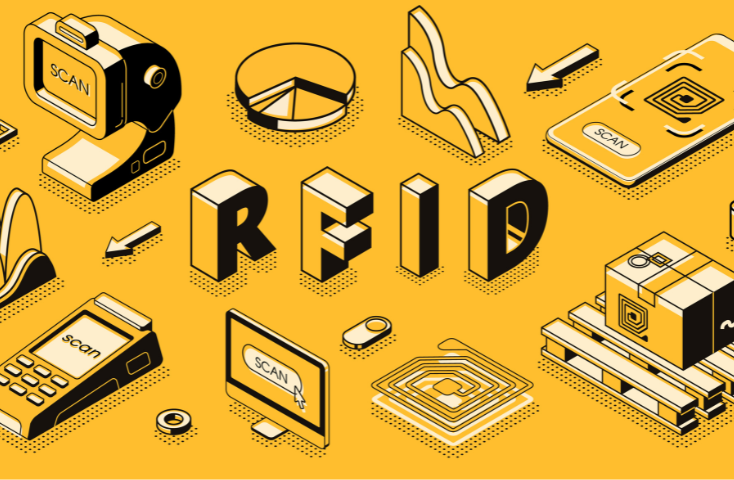Trend Article
5 Reasons Why Your Business Should Invest in RFID Labels
RFID (Radio Frequency Identification) technology has become increasingly popular in recent years, particularly in the realm of supply chain management. RFID labels can provide a number of benefits for businesses, especially those in the consumer-packaged goods (CPG) industry.

Share
Here are just five reasons why CPG customers should consider incorporating RFID into their packaging:
-
Improved inventory management: RFID tags can be used to track inventory in real-time, providing more accurate and up-to-date information on stock levels. This can help businesses reduce stockouts and overstocks, leading to more efficient operations and cost savings.
Increased efficiency: RFID tags can be read much more quickly than traditional barcodes, which can improve the speed and accuracy of inventory tracking and other supply chain processes.
-
Better visibility: With RFID technology, businesses can track products throughout the supply chain, from production to delivery to the end customer. This increased visibility can help businesses identify and address issues more quickly, improving customer satisfaction and reducing the risk of product recalls.
-
Product authenticity validation: RFID labels can be configured to be tamper indicating and the data can be used to monitor and identify grey market diversion.
-
Compliance with regulations: Some industries, such as healthcare and food and beverage, are required to track products through the supply chain to comply with regulations. RFID technology can make it easier for businesses to comply with these regulations and avoid fines.
Many brands across various industries are already using RFID tags. Here are some examples:
- Zara: The fashion retailer Zara uses RFID tags to track inventory in their stores, which has helped them improve their inventory management and reduce out-of-stocks.
- Macy’s: The department store Macy’s uses RFID technology to track inventory in their stores and distribution centers, which has helped them improve their order fulfillment and reduce costs.
- Coca-Cola: The beverage company Coca-Cola uses RFID tags to track their products throughout the supply chain, from production to delivery to the end customer. This has helped them improve their supply chain efficiency and visibility.
- Johnson & Johnson: The healthcare company Johnson & Johnson uses RFID tags to track their medical devices and pharmaceuticals, which helps them comply with regulatory requirements and ensure the safety and quality of their products.
- Nestle: The food and beverage company Nestle uses RFID tags to track their products in their warehouses and distribution centers, which has helped them improve their inventory management and reduce waste.
As the technology continues to evolve and become more affordable, it is likely that more businesses will begin to incorporate RFID into their operations.
Beyond the world of RFID, smart packaging in general is an emerging technology that can provide a range of benefits for businesses and consumers alike. Here are some other ways that smart packaging is used in real life:
- Temperature-sensitive packaging: Some products, such as vaccines and perishable foods, require strict temperature control to maintain their efficacy and freshness. Smart packaging can include temperature sensors and indicators that alert users if the product has been exposed to temperatures outside of the safe range.
- Tamper-evident packaging: Smart packaging can include features such as seals and holograms that make it difficult to tamper with the product without leaving evidence. This can help prevent counterfeiting and ensure the safety and integrity of the product.
- Interactive packaging: Smart packaging can include features such as QR codes and NFC tags that allow consumers to interact with the product in new ways. For example, a QR code on a food package could take consumers to a recipe website, or an NFC tag on a cosmetics package could launch an augmented reality experience.
- Anti-theft packaging: Some products, such as high-value electronics and luxury goods, are at risk of theft. Smart packaging can include features such as RFID tags and GPS tracking that help prevent theft and aid in recovery if the product is stolen.
- Sustainability-focused packaging: Smart packaging can also be used to promote sustainability and reduce waste. For example, a package could include a sensor that indicates when the product has been fully consumed, or it could include instructions for proper disposal or recycling.
Explore more smart packaging solutions for Healthcare here.
If you’re considering incorporating RFID into your packaging strategy, we’re here for it. In addition to the five reasons listed above, customers have turned to MCC for help in this arena because we have the capabilities to embed and encode tags for them.
We also know that programs are being mandated by the Walmart’s of the world, and it’s better to stay ahead of the rising demand.
We offer turnkey solutions for our customers to use with smart labels to give the consumer an interactive experience with their product. Not to mention, our Equipment Solutions Group in North America can create custom application equipment to cover that step of the implementation process.